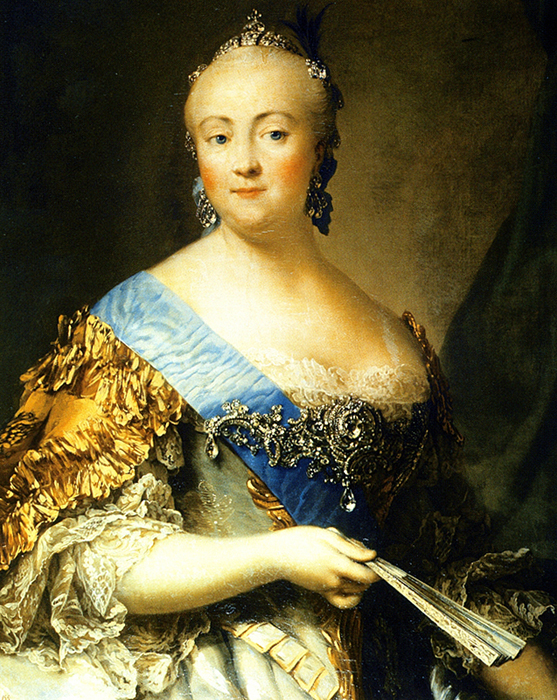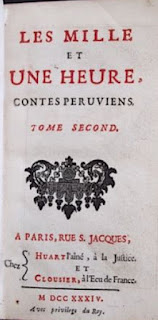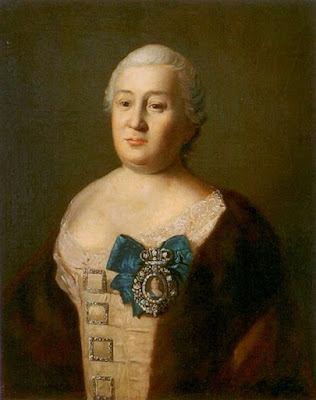007.1. Empress Elizaveta Petrovna / Елизавета Петровна
 According to Golicyn (109-110), the Empress Elizabeth, known in Russian as Elizaveta Petrovna (1709-1761), who reigned from 1741 until her death in 1761, wrote three brief verses and part of an acrostic. Most literary historians have regarded this output as insufficient evidence that she was a bonafide writer and it has failed to secure her a place in literary history.[1] Nonetheless, even these few literary fragments – if they are really hers – arguably make Elizabeth a more prominent cultural actor than many of her peers: if she wrote less than her great aunt, Natal'ja Alekseevna, she perhaps wrote more than Sof'ja Alekseevna, or Peter the Great's semi-illiterate wife, Catherine I (author of a handful of letters), or the Empress Anna Ioannovna. But did she really write these texts or is Elizabeth's authorship merely, as Amanda Ewington (23) has suggested, the stuff of legends? Let's look at these verses in the next few posts.
According to Golicyn (109-110), the Empress Elizabeth, known in Russian as Elizaveta Petrovna (1709-1761), who reigned from 1741 until her death in 1761, wrote three brief verses and part of an acrostic. Most literary historians have regarded this output as insufficient evidence that she was a bonafide writer and it has failed to secure her a place in literary history.[1] Nonetheless, even these few literary fragments – if they are really hers – arguably make Elizabeth a more prominent cultural actor than many of her peers: if she wrote less than her great aunt, Natal'ja Alekseevna, she perhaps wrote more than Sof'ja Alekseevna, or Peter the Great's semi-illiterate wife, Catherine I (author of a handful of letters), or the Empress Anna Ioannovna. But did she really write these texts or is Elizabeth's authorship merely, as Amanda Ewington (23) has suggested, the stuff of legends? Let's look at these verses in the next few posts.
The first verse that Golicyn attributes to Elizabeth is an "elegy dedicated to the memory of Aleksej Nikiforovič Šubin, written around 1735-1740" and thus before she ascended the throne. If Elizabeth actually wrote this and did so in these years, her elegy mourns earthly separation rather than death, for Šubin (whose patronymic was, by the way, not Nikiforovič, but Jakovlevič) was still alive at her coronation. Elizabeth never married and later writers such as Bantyš-Kamenskij (1847), Mel'nikov-Pečerskij (1868), and Mordovcev (1874) have lavishly garnished her sentimental biography with novelistic detail, describing Šubin as a handsome young officer for whom the empress-to-be fell head over heels in love. Anna Ioannova, who reigned at the time, was alarmed by the relationship between her rival Elizabeth and Šubin, a military man whose connections could perhaps remove her from power: so she exiled him to Kamchatka and this event supposedly provoked Elizabeth's poetic composition. When Elizabeth herself later became empress (by taking the throne from Anna Ioannovna's successor, the young Ivan VI in 1741), she called Šubin back to the capital and bestowed upon him rank and rewards, but he seems to have recovered neither her favor nor his own health and soon left the court to live on his new rural properties.
Curiously, there appears to be no link between the Empress and these verses prior to 1847, when Bantyš-Kamenskij published a stanza, coyly claiming to "have seen in Moscow a song written by the maiden who passionately loved Šubin", a song that "though its style has become old-fashioned, breathes with ardent sentiment" (549-50). Was it Bantyš-Kamenskij, then, who invented the idea that Elizabeth Petrovna had been a writer? The attribution of this stanza to Elizabeth was subsequently reiterated by Mel'nikov-Pečerskij and by Mordovcev, who reprinted the same lines found in Bantyš-Kamenskij. A fuller text of the poem appeared in the Account (Отчет) of holdings at the Imperial Public Library (1870). Without hazarding a guess as to possible addressees, the library publication includes four complete stanzas from what is described as nothing less than a "verse in the hand of Empress Elizaveta Petrovna, who, as is well known, wrote poetry while still a princess" (159-60):
Curiously, there appears to be no link between the Empress and these verses prior to 1847, when Bantyš-Kamenskij published a stanza, coyly claiming to "have seen in Moscow a song written by the maiden who passionately loved Šubin", a song that "though its style has become old-fashioned, breathes with ardent sentiment" (549-50). Was it Bantyš-Kamenskij, then, who invented the idea that Elizabeth Petrovna had been a writer? The attribution of this stanza to Elizabeth was subsequently reiterated by Mel'nikov-Pečerskij and by Mordovcev, who reprinted the same lines found in Bantyš-Kamenskij. A fuller text of the poem appeared in the Account (Отчет) of holdings at the Imperial Public Library (1870). Without hazarding a guess as to possible addressees, the library publication includes four complete stanzas from what is described as nothing less than a "verse in the hand of Empress Elizaveta Petrovna, who, as is well known, wrote poetry while still a princess" (159-60):
Всякiй раз(с)уждает как в свете бъ жить,
А нидоумеваетъ как з рохомъ бы быть;
Что така тоска и жизнь не мила,
А нидоумеваетъ как з рохомъ бы быть;
Что така тоска и жизнь не мила,
Когда друхъ не зритъся, луче бъ жизнь лишитъся
Вся то красота.
Я не в своей мочи огнь утушить,
Серцем и болею, да чем пособить,
Что всегда разлучно и без тебе скучно,
Лехъче бъ тя не спати, нежель такъ страдати
Всегда по тебе.
О нещастие злое, долго ль мя мучить,
О чемъ я страдаю, то не даешь зрить;
Или я одна тебе одаица [?],
Что меня мучити, тем ея веселити
И жизнь лишити.
Куда красныя дни [?] тогда бывали
Когда мои очи тя не видали,
Ахъ! не были в скуке и ни [?] в какой муке
Kaк цветъ процветали.
Вся то красота.
Я не в своей мочи огнь утушить,
Серцем и болею, да чем пособить,
Что всегда разлучно и без тебе скучно,
Лехъче бъ тя не спати, нежель такъ страдати
Всегда по тебе.
О нещастие злое, долго ль мя мучить,
О чемъ я страдаю, то не даешь зрить;
Или я одна тебе одаица [?],
Что меня мучити, тем ея веселити
И жизнь лишити.
Куда красныя дни [?] тогда бывали
Когда мои очи тя не видали,
Ахъ! не были в скуке и ни [?] в какой муке
Kaк цветъ процветали.
Many
questions arise. Where did this text come from? Is
this the text that Bantyš-Kamenskij
saw in Moscow? Does
it still exist in
the library's collection today
(now the Russian National Library's)? Is so, has the library since decided that it is not Elizabeth's writing after all
and altered its files regarding the presumed author?
What other
circumstances may
have encouraged
Bantyš-Kamenskij
and
others to attribute this to Elizabeth in the first place?
In any case, even if we are not sure who wrote these stanzas, they were attributed to Elizabeth for several decades and can, dear students, certainly be translated!
FURTHER READING:
Бантыш-Каменский, Д. Н. Словарь достопамятных людей Русской земли. т. 3. СПб.: Тип. Карла Крайя, 1847, 548-50.
Ewington, Amanda. Russian Women Poets of the Eighteenth and Early Nineteenth Centuries: A Bilingual Edition. Toronto: Iter, Inc. and Centre for Reformation and Renaissance Studies, 2014.
Мельников, П. И. ("Андрей Печерский"), "Княжна Тараканова и принцесса Владимирская", (1867), Собрание сочинений, т. 3. М.: Правда, Библиотека "Огонек", 1976.
Мордовцев, Д. Л., "Императрица Елизавета Петровна" в: Русские исторические женщины, ч. 2: Женщины второй половины XVIII века. СПб.: А. Черкесов и К., 1874.
Отчет Императорской публичной библиотеки за 1870 г. СПб. 1872.159-60.
NOTES:
[1] Despite occasional claims that Elizaveta Petrovna was "Russia's first woman poet" (see, for example, the history textbook by A. A. Slezin), there is no entry for her in Novikov's Opyt istoričeskogo slovarja o rossijskich pisateljach (1772), in the Dictionary of Russian Women Writers (1994), or in the Slovar' russkich pisatelej XVIII (1988-2010) to name just a few.
ILLUSTRATIONS:
NOTES:
[1] Despite occasional claims that Elizaveta Petrovna was "Russia's first woman poet" (see, for example, the history textbook by A. A. Slezin), there is no entry for her in Novikov's Opyt istoričeskogo slovarja o rossijskich pisateljach (1772), in the Dictionary of Russian Women Writers (1994), or in the Slovar' russkich pisatelej XVIII (1988-2010) to name just a few.
ILLUSTRATIONS:
2. Unfinished portrait of Elizabeth Petrovna (1720s) at the Russian Museum in Petersburg. Sometimes credited to Ivan Nikitin, it is now believed to be the work of Louis Caravaque (courtesy of Russian Wikipedia).




I would love to know more about that stanzaic form -- it seems innovative to me, but maybe it is common in the era?
ReplyDeleteThat is a really good question and one that I can't (yet) answer. Is it striking isn't it? It might be a well-established stanzaic form in the context of folk poetry/song. Do you think there is a line missing from stanza four, or is the form a bit elastic?
ReplyDeleteThis comment has been removed by a blog administrator.
ReplyDelete